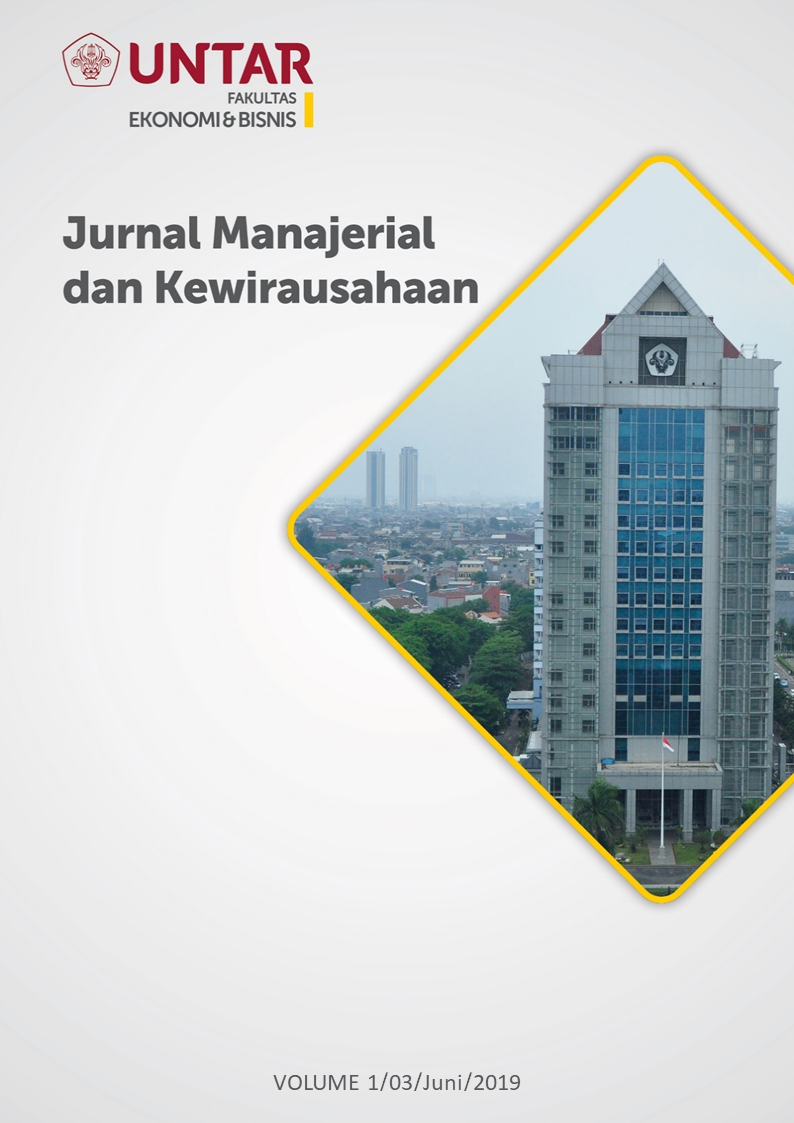Pengaruh Entrepreneurial Munificence Dan Efikasi Diri Terhadap Entrepreneurial Alertness Wirausaha
Main Article Content
Abstract
The purpose of this study is to find out 1) whether there is an influence of Entrepreneurial Munificence on Entrepreneurial Alertness 2) whether there is an influence of the Self-Efficacy on Entrepreneurial Alertness. The population in this study were entrepreneurs who are MSME owners. The sample used in this study was 32 respondents from the Entrepreneurs who are MSME wners in Citra Garden and Muara karang. The sampling technique used was nonprobability sample with purposive sampling sampling method. Overall the results of this study are 1) Entrepreneurial Munificence has no effect on Entrepreneurial Alertness of Entrepreneur in Citra Garden and Muara Karang 2) Self Efficacy has a significant influence and positively related to Entrepreneurial Alertness of Entrepreneur in Citra Garden and Muara Karang.
Tujuan penelitian ini adalah untuk mengetahui 1) apakah terdapat pengaruh Entrepreneurial Munificence terhadap Entrepreneurial Alertness. 2) apakah terdapat pengaruh Efikasi Diri terhadap Entrepreneurial Alertness. Populasi dalam penelitian ini adalah Wirausaha yang merupakan pemilik UMKM. Sampel yang digunakan pada penelitian ini yaitu 32 responden wirausaha yang merupakan pemilik UMKM di Citra Garden dan Muara Karang. Teknik pengambilan sampel yang digunakan yaitu nonprobability sample dengan metode pengambilan sampel purposive sampling. Secara keseluruhan hasil dari penelitian ini yaitu 1) Entrepreneurial Munificence tidak memiliki pengaruh terhadap Entrepreneurial Alertness wirausaha di Citra Garden dan Muara Karang, 2) Efikasi diri memiliki pengaruh yang signifikan dan berhubungan positif terhadap Entrepreneurial Alertness wirausaha di Citra Garden dan Muara Karang.
Article Details
This work is licensed under a Jurnal Muara Ilmu Ekonomi dan Bisnis Creative Commons Attribution-ShareAlike 4.0 International License.,/p>
References
Aritonang, Lerbin R. (2007). Riset Pemasaran. Cetakan Pertama. Bogor: Ghalia Indonesia.
Boyd, N.G. and Vozikis, G.S. (1994) The influence of self-efficacy on the development of
entrepreneurial intentions and actions, Entrepreneurship Theory and Practice, Vol. 18
No. 1, pp. 63-90
Clark, T. (1994). Environment management: the construct and research proportions. Journal
of business research, vol 29(1). 33-38
Dess, G.G. and Beard, D. W. (1984). Dimension of Organitational Task Environments,
Administrative Science Quarterly, Vol. 29 No. 1, pp 52-73
Dubini, P. (1988). The influence of motivations and environment on business startups: some
hints for public policies, Journal of Business Venturing, Vol. 4 No. 1, pp. 11-26
Gnyawali, D. and Fogel, D. (1994). Environments for entrepreneurship development: key
dimensions and research implications, Entrepreneurship Theory and Practice, Vol. 18
No. 4, pp. 43-63.
Hills, G.E. and Shrader, R.C. (1998), Successful entrepreneurs’ insights into opportunity
recognition, Frontiers of Entrepreneurship Research, pp. 30-43
Hisrich, R.D., Peters, M.P., dan Stepherd, D.A. (2008). Kewirausahaan Edisi 7. Edisi Bahasa
Indonesia. Jakarta: Salemba Empat
Kirzner, I.M. (1979). Perception, Opportunity, and Profit, University of Chicago Press,
Chicago, IL
Ko, S. (2004), “Bisociation and opportunity”, in Butler, J.E. (Ed.), Opportunity Identification
and Entrepreneurial Behavior, Information Age Publishing, Greenwich, CT, pp. 99-11
Nikraftar T. and Hossein E. (2015). Factors affecting entrepreneurial opportunities
recognition in tourism small and medium sized enterprises, Tourism Review, Vol. 71 Iss
Pech, R.J. and Cameron, A. (2006). An entrepreneurial decision process model describing
opportunity recognition, European Journal of Innovation Management, 9(1), 61-78
Randolph, W. and Dess, G. (1984). The congruence perspective of organization design: a
conceptual model and multivariate research approach. Academy of Management
Review, Vol. 9 No. 1, pp. 114-27
Scarborough, N.M. and Jeffrey R.C. (2016). Essential of Entrepreneurship and Small Business
Management. England: Courier kendallville
Sekaran, U. and Bougie, R. (2006). Research Mehtods for Business 6th Edition. West Sussex:
Wiley
Slamet, Franky. (2013). Dasar-Dasar Kewirausahaan: Teori dan Praktik. Jakarta: PT, indeks.
Sugiyono. (2005). Metode Penelitian Bisnis. Bandung: Alfabeta
Supranto, J. (2007). Statistik untuk pemimpin berwawasan global. Edisi ketiga, Jakarta:
Salemba Empat
Tang, J. (2008). Environmental munificence for entrepreneurs: entrepreneurial alertness and
commitment, International Journal of Entrepreneurial Behavior & Research, Vol. 14
Issue: 3, pp.128-151
______. (2009). Exploring the Constitution of Entrepreneurial Alertness: The Regulatory
Focus View, Journal of Business Venturing
Yu, T.F.L. (1997), Entrepreneurship and Economic Development in Hong Kong, Routledge,
London



